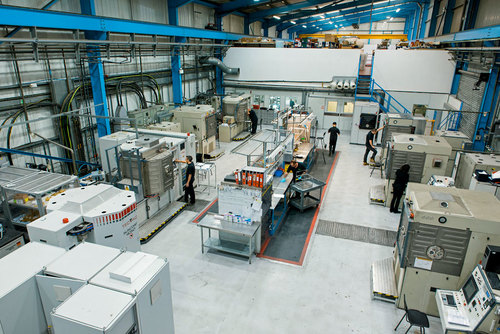Hip and Knee Replacements to Benefit in a Medical Device Breakthrough from Aerospace Hard Coating Technology
An innovative process that enables titanium alloy to replace steel based bearings in Airbus 350 and 380 landing gear is undergoing trials for use in hip and knee replacements. Funding has been awarded by Innovate UK, the government backed sponsor for technology, to Wallwork Cambridge, the advanced hard coatings specialists, to research the medical application of this process.
The company is already working on micro-thin smooth bio-active coatings for medical devices so the programme may deliver revolutionary changes for this area of orthopaedic surgery. The programme has promise as an enabling technology that may lead to customised implants made by additive manufacturing. In the future, patients may be able to enjoy lighter, stronger, safer and longer-lasting joint replacements. There could also be potentially huge savings for the NHS from more effective primary surgery, reduced secondary interventions and longer life implants that could outlive the patients.
Already widely used in orthopaedic surgery as bone splints, plates and other devices, titanium is attractive because of its high strength, fatigue resistance, lightness and good bio-compatibility. On the downside, in longer term use sometimes causes harmless, but unsightly staining to skin tissue. More significantly, it is unsuited to load-bearing situations due to its poor coefficient of friction that limits smooth surface to surface movement. Wallwork overcome this in aerospace applications with a duplex process where deep nitrided cases are first created in the metal surface to make it more resilient. This is then followed by the application of a hard micro-thin and highly lubricious coating by physical vapour deposition (PVD).
Wallwork Group is one of the largest and most experienced PVD companies in Europe, offering a range of processes to improve the metallurgical properties of components in the harsh and demanding environments found in aerospace, motorsport and medical applications. In addition to building their own PVD machines, they have extensive laboratories for research, new product development, quality control and compliance to international aerospace and engineering standards.
Currently, alloys of cobalt, chrome and molybdenum (CoCrMo) or ceramics are the preferred materials for hip and knee replacements. These materials are sometimes used for both parts of the joint, but often one component may be made from high density polymer. Issues have arisen of metal-ion leakage, particularly from CoCrMo devices in metal-on-metal joints, plastic degradation has been found in hybrid metal/polymer joints whilst ceramic implants may be subject to breakage or chipping – especially when implanted in active individuals. Patients may suffer pain, discomfort and damage to the tissues surrounding the joint requiring further major surgical intervention.
A patented hard coating under development at Wallwork, Agilliant, will provide an effective barrier against the release of metal ions and it also includes a small proportion of silver, to give active protection from post-operative infection. The material is super smooth, permitting the easy passage of tendons so that they do not become inflamed. The barrier is effective against bio-tribo corrosion by the synovial fluid that still acts as a natural joint lubricant in artificial implants.
Head of research and development at Wallwork, Dr Jonathan Housden explained, “Our duplex coating process is highly effective in landing gear bearings. By using Agilliant as the final coating, we hope to be able to offer a new generation of light, strong, safer and more durable titanium knee and hip joints. These will be more comfortable for the patient with fewer complications caused by post-operative infection and mechanical wear. Early mechanical trials to simulate years of use suggest that the joints will likely outlive the patient, leading to a £300 million annual saving for the NHS by allowing more efficient use of orthopaedic resources as rework of failed or compromised treatments is reduced substantially.”
Wallwork is collaborating with the Institute for Functional Surfaces at the University of Leeds in relation to the aerospace technology transfer. They are also working with a leading prostheses manufacturer for the commercialisation of the Agilliant coating. Extreme care is taken with the development of all new technologies in the medical field, but the company anticipates the first patient trials for the new devices could commence in four years after completion of intensive laboratory simulations. The process could be widely available within seven to ten years.
More Information:
Howard Maher, Sales Manager
Tel. +44 (0)161 797 9111 Fax. +44 (0)161 763 1861
E-mail: howard.maher@wallworkht.com Web: www.wallworkht.com
Wallwork Group, Lord Street, Bury, Greater Manchester, BL9 0RE
Images: www.ainsmag.co.uk/client-news/wallwork-group/aircraft-techno...
